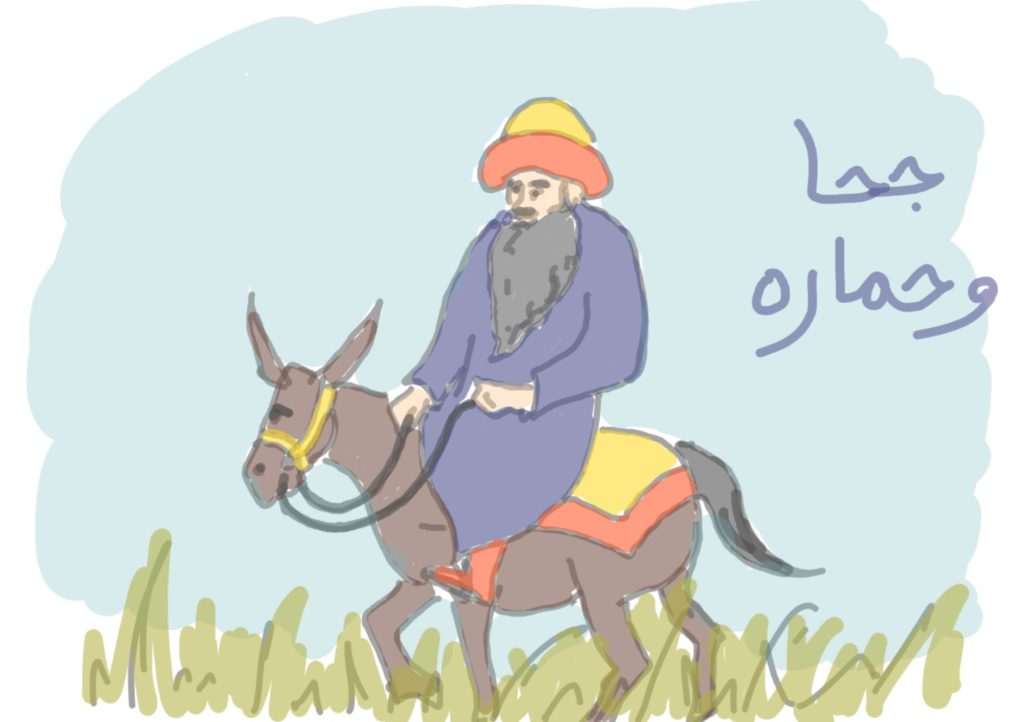Juha, His Son and the Donkey جحا وابنه والحمار Posted by yasmine on Feb 23, 2022 in Arabic Language, folklore, Juha
In every culture, certain characters شخصيات emerge over time with their own way of teaching us life lessons دروس الحياة. Juha جُحا is one of those characters who’s tales حكايات have been around for centuries قرون beginning from the seventh century. He is what you call a wise old fool عجوز أحمق حكيم. This foolishness حماقة has made good for funny jokes نكت مضحكة and satire. In this post, I chose one of Juha’s well known tales that feature his son and his donkey called جُحا وابنه والحمار. I found a clip narrating this story which I have transcribed below to help us follow along as well as analyze the moral of the story and grammatical features.
Before we begin, here is a short paragraph in Arabic about جُحا.
من هو جحا؟
هو اسم لشخصية اشتهرت بالفكاهة والنوادر المضحكة. ظهرت قصص جحا في القرن السابع الميلادي وانتشرت في عدة ثقافات قديمة. وتناقل الناس نوادره وزادوا عليها إلى يومنا هذا
الفُكاهة: humor
النوادِر: anecdotes
المُضحِكة: funny
وتناقل الناس: people passed them on
زادوا عليها: they added to them
جحا وابنه والحمار
ركب جحا حماراً ومشي ابنه خلفه ومر أمام جماعة فقالوا: أنظروا إلى هذا الرجل الذي خلا قلبه من الشفقة يركب هو ويترك ابنه يمشي. فنزل جحا ومشى واركب ابنه. ومر على جماعة فقالوا: أنظروا إلى هذا الغلام غير المؤدب يركب الحمار ويترك أباه يمشي. فركب جحا وابنه الحمار وسارا. فمرا من جماعة وقالوا: أنظروا إلى هذا الرجل القاسي يركب هو وابنه ولا يرفقان بالحمار. فنزل جحا وابنه ومشيا خلفه. فمرا من جماعة جديدة فقالوا: أنظروا إلى هذين المغفلين يتعبان من المشي وأمامهم الحمار لا يركبانه. وبعد أن جاوازاهم، حمل جحا وابنه الحمار. وسارا به ومروا بجماعة جديدة فضحكوا منهما وقالوا: أنظروا إلى هذين المجنونين يحملان الحمار بدلاً من أن يحملهما. وحين إذن أنزلاه. قال جحا لابنه: اسمع يا بنيه إنك لا تستطيع أن تظفر برضى الناس جميعاً، قم بما تراه مناسباً فإرضاء الناس غاية لا تدرك
Juha, His Son and the Donkey
Juha rode a donkey, and his son walked behind him. They passed by a group that said: Look at this man, whose heart is devoid of pity. He rides and lets his son walk. Juha got down to walk and had his son ride. He passed by a group of people that said: Look at this impolite boy riding a donkey and letting his father walk. So Joha and his son both rode the donkey and continued on their way. They passed by a group that said: Look at this cruel man riding with his son. They are not kind to the donkey. So Joha and his son got down from the donkey and walked behind it. They passed by a new group that said: Look at these two idiots who are tired of walking and in front of them is a donkey that they do not ride. After passing them, Juha and his son carried the donkey. They walked with it and passed a new group, who laughed at them and said: Look at these two madmen carrying the donkey instead of it carrying them. Just then, he put it down. Juha said to his son: Listen, my son, you cannot win the approval of all people. Do what you see fit, for pleasing people is an unattainable goal.
ما رأيك بالقصة؟
هل هناك أي طريقة أخرى يمشوا بها جحا وابنه والحمار ويرضوا الناس؟
What do you think of the story?
Is there any other way for Juha, his son and the donkey to walk and please the people?
✨You’ll notice this story is full of verbs and adjectives that are in the dual masculine form referring to both Juha and his son. Can you spot some examples?
وسارا
فمرا
ومشيا
المغفلين
يتعبان
المجنونين
يحملان |
I hope you enjoyed this tale of Juha. There are many slightly different versions of this same story and of course many other tales of Juha.
Till next week, happy Arabic learning! 😊

Build vocabulary, practice pronunciation, and more with Transparent Language Online. Available anytime, anywhere, on any device.




